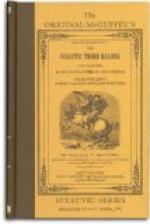2. “Why, sir,” replied the old man, looking grave, “that depends entirely upon the use to which it is applied. It may be a blessing or a curse. Knowledge is only an increase of power, and power may be a bad, as well as a good thing.” “That is what I can not understand,” said the bustling little man. “How can power he a bad thing?”
3. “I will tell you,” meekly replied the old man; and thus he went on: “When the power of a horse is under restraint, the animal is useful in bearing burdens, drawing loads, and carrying his master; but when that power is unrestrained, the horse breaks his bridle, dashes to pieces the carriage that he draws, or throws his rider.” “I see!” said the little man.
4. “When the water of a large pond is properly conducted by trenches, it renders the fields around fertile; but when it bursts through its banks, it sweeps everything before it and destroys the produce of the fields.” “I see!” said the little man, “I see!”
5. “When the ship is steered aright, the sail that she hoists enables her sooner to get into port; but if steered wrong, the more sail she carries the further will she go out of her course.” “I see!” said the little man, “I see clearly!”
6. “Well, then,” continued the old man, “if you see these things so clearly, I hope you can see, too, that knowledge, to be a good thing, must be rightly applied. God’s grace in the heart will render the knowledge of the head a blessing; but without this, it may prove to us no better than a curse.” “I see! I see!” said the little man, “I see!”
Definitions.—l. Bus’tling, very active, stirring. Sub’ject, the thing treated of. 3. Meek’ly, mildly, quietly, gently. Re-straint’, anything which hinders. Bur’dens, loads. 4. Con-duct’ed, led, guided. Trench’es, ditches. Fer’tile, producing much fruit, rich. Prod’uce, that which is yielded or produced. 5. Steered’, guided, directed. Hoists, raises. 6. Ap-plied’, directed, made use of.
Exercises—What is the subject of this lesson? Is knowledge always a power? Is it always blessing? Relate the several examples of power wrongly used. If we use the powers that God has given us for bad purposes, what will our knowledge prove to be?
LVII. GOOD WILL. (153) By J. T. Trowbridge.—(Adapted)
1. I suppose you all, my boys, are looking for some sort of success in life; it is right that you should; but what are your notions of success? To get rich as soon as possible, without regard to the means by which your wealth is acquired?
2. There is no true success in that: when you have gained millions, you may yet be poorer than when you had nothing; and it is that same reckless ambition which has brought many a bright and capable boy, not to great estate at last, but to miserable failure and disgrace; not to a palace, but to a prison.




